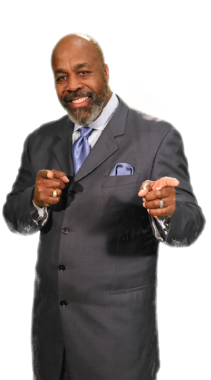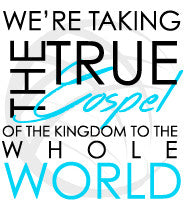Is Easter the Passover?
Posted on Wednesday, September 16 2015 02:27:00 PM in Teachings by Arthur Bailey
As a child growing up in Mississippi as far back as I could remember, there were two times a year I knew I would be getting something new. The first was Christmas and the second was Easter. On Easter Sunday morning, people would come to church in their new clothes and it would be like an unrehearsed fashion show. We all wanted to look good on that great getting-up morning on Resurrection Sunday. The highlight of this annual ritual culminated with the Easter egg hunt. Those were the days.
The preacher would preach about how early one Sunday morning when the women came to the tomb, Jesus was gone. They would preach about how Jesus was nailed to the cross on Good Friday and how He rose from the grave early Sunday morning.
As a child I knew there was something wrong with the math, but dared not question how Jesus could be in the grave for three days and three nights between Good Friday and Sunday morning. All that really mattered was that He rose from the grave early that Sunday morning that is commonly referred to as “Resurrection Sunday”
The apostle Paul wrote in his letter to the Corinthian congregation these words: “When I was a child, I talked like a child, I thought like a child, I reasoned like a child. When I became a man, I put childish ways behind me” 1st Cor. 13:11.
As a man I raise the question how could Jesus be in the grave for three days and three nights between Friday afternoon and Sunday morning? After much study and research, a deeper question is: Why do the Christian churches celebrate Easter at all, instead of Passover? Are Easter and Passover two different celebrations, or are they one and the same? Is Easter even biblical? If not, why do the Christian churches celebrate Easter? Where did Easter come from?
The Word "Easter" appears only once in the King James Version of the Bible and is taken from the word "Passover."
Acts 12:4 "And when he had apprehended him, he put him in prison, and delivered him to four quaternions of soldiers to keep him; intending after Easter to bring him forth to the people." (KJV)
The New International Version uses the proper English word "Passover."
Acts 12:4 "After arresting him, he put him in prison, handing him over to be guarded by four squads of four soldiers each. Herod intended to bring him out for public trial after the Passover." (NIV)
The Complete Jewish Bible uses the proper Hebrew word "Pesach."
Acts 12:4 "so when Herod seized him, he threw him in prison, handing him over to be guarded by four squads of four soldiers each, with the intention of bringing him to public trial after Pesach." (CJB)
The word is “Easter” in the English, but it is from the Greek word “Pascha” translated from the Hebrew word “Pesach.” The following two references shed greater light on the word Easter and its origin.
Easter
O.E. Eastre (Northumbrian Eostre), from P.Gmc. *Austron, a goddess of fertility and sunrise whose feast was celebrated at the spring equinox, from *austra-, from PIE *aus- “to shine” (especially of the dawn). Bede says Anglo-Saxon Christians adopted her name and many of the celebratory practices for their Mass of Christ’s resurrection. Ultimately related to east. Almost all neighboring languages use a variant of L. Pasche to name this holiday. Easter Island so-called because it was discovered by Europeans on Easter Sunday, 1722. Online Etymology Dictionary, © 2001 Douglas Harper
Easter
Originally a Saxon word (Eostre), denoting a goddess of the Saxons, in honour of whom sacrifices were offered about the time of the Passover. Hence the name came to be given to the festival of the Resurrection of Christ, which occurred at the time of the Passover. In the early English versions this word was frequently used as the translation of the Greek pascha (the Passover).
Is Easter the Passover?
When the Authorized Version (1611) was formed, the word “passover” was used in all passages in which this word pascha occurred, except in Act 12:4. In the revised version, the proper word “passover” is always used. Easton’s 1897 Bible Dictionary. A closer look at the actual passage would clearly connect this verse to the season of Passover. Acts 12:1-4
Acts 12:1 "Now about that time Herod the king stretched forth his hands to vex certain of the church."
Ac 12:2 "And he killed James the brother of John with the sword."
Ac 12:3 "And because he saw it pleased the Jews, he proceeded further to take Peter also. (Then were the days of unleavened bread.)"
What are the days of Unleavened Bread?
Leviticus 23:4 "These are the feasts of the LORD, even holy convocations, which ye shall proclaim in their seasons."
Lev 23:5 "In the fourteenth day of the first month at even is the LORD’S passover."
Lev 23:6 "And on the fifteenth day of the same month is the feast of unleavened bread unto the LORD: seven days ye must eat unleavened bread."
Passover together with the Feast of Unleavened Bread is an eight-day feast.
Passover and Feast of Unleavened Bread are two separate feasts although they are back-to-back (i.e. Unleavened Bread begins the next day after Passover). Yet in the passages below it states: “Then were the days of unleavened bread” placing Passover and Unleavened Bread together with Passover.
Ac 12:1 "Now about that time Herod the king stretched forth his hands to vex certain of the church."
Ac 12:2 "And he killed James the brother of John with the sword."
Ac 12:3 "And because he saw it pleased the Jews, he proceeded further to take Peter also. (Then were the days of unleavened bread.)"
Herod waited until after the eight days of celebrating the Passover and Unleavened Bread to probably kill Peter as he had killed James, but YeHoVaH delivered Peter from the prison.
So we see that the word "Easter" in the Bible refers to the Passover and not some separate Christian holiday.
So why does the Christian Church celebrate Easter and not Passover? The Christian Church inherited all of its traditions and celebrations from the Catholic Church including Christmas, Lent, Palm Sunday, Good Friday, etc. When Martin Luther protested the Catholic Church's Authority on Indulgences in 1517, it gave birth to the Protestant Church movement that was named after Luther’s protest (thus Protest-ant). However Martin Luther was a devout Catholic and therefore he and all who followed him continued to keep the Catholic Church traditions and celebrations including Easter and Christmas. These became the two holiest days of the Christian calendar and yet neither of them are found anywhere in scripture.
The Pope of the Catholic Church claimed complete authority to change scripture. Here are some excerpts from the book Sunday is not the Sabbath by Apostle Arthur Bailey, D. Div.
“The Pope is of so great authority and power that he can modify, explain, or interpret even pine law. The pope can modify pine law, since his power is not of man, but of God, and he acts a vicegerent of God upon earth” Lucius Ferraris, Prompta Bibliotheca, art. Papa, II, Vol. VI, p. 29.
“The leader of the Catholic Church is defined by the faith as the Vicar of Jesus Christ (and is accepted as such by believers). The Pope is considered the man on earth who “takes the place” of the Second Person of the omnipotent God of the Trinity.” John Paul II, http://www.sabbathtruth.com/documentation/crossing.asp p. 3, 1994
“If Protestants would follow the Bible, they would worship God on the Sabbath Day. In keeping the Sunday they are following a law of the Catholic Church.” Albert Smith, Chancellor of the Archdiocese of Baltimore, replying for the Cardinal, in a letter dated February 10, 1920.
“The observance of Sunday by the Protestants is homage they pay, in spite of themselves, to the authority of the [Catholic] Church.” Monsignor Louis Segur, "Plain Talk about the Protestantism of Today," p. 213.
Did Jesus (Yeshua) resurrect on Sunday morning?
Let us look at the evidence of scripture:
- Mt 28:1 "After the Sabbath, at dawn on the first day of the week, Mary Magdalene and the other Mary went to look at the tomb."
- Mt 28:5 "The angel said to the women, 'Do not be afraid, for I know that you are looking for Jesus, who was crucified.'"
- Mt 28:6 "He is not here; he has risen, just as he said. Come and see the place where he lay."
- Mk 16:2 "Very early on the first day of the week, just after sunrise, they were on their way to the tomb."
- Mk 16:5 "As they entered the tomb, they saw a young man dressed in a white robe sitting on the right side, and they were alarmed."
- Mk 16:6 “'Don’t be alarmed,' he said. 'You are looking for Jesus the Nazarene, who was crucified. He has risen! He is not here. See the place where they laid him.'"
- Mk 16:9 "When Jesus rose early on the first day of the week, he appeared first to Mary Magdalene, out of whom he had driven seven demons."
- Lk 24:1 "On the first day of the week, very early in the morning, the women took the spices they had prepared and went to the tomb."
- Lk 24:2 "They found the stone rolled away from the tomb,"
- Lk 24:3 "but when they entered, they did not find the body of the Lord Jesus."
- Lk 24:4 "While they were wondering about this, suddenly two men in clothes that gleamed like lightning stood beside them."
- Lk 24:5 "In their fright the women bowed down with their faces to the ground, but the men said to them, 'Why do you look for the living among the dead?'"
- Lk 24:6 "He is not here; he has risen! Remember how he told you, while he was still with you in Galilee:"
- Jn 20:1 "Early on the first day of the week, while it was still dark, Mary Magdalene went to the tomb and saw that the stone had been removed from the entrance."
- Jn 20:2 "So she came running to Simon Peter and the other disciple, the one Jesus loved, and said, 'They have taken the Lord out of the tomb, and we don’t know where they have put him!'”
In other words He is GONE. In all these passages the women went to the tomb early the first day of the week and Yeshua was already risen (GONE). So how can they say that He rose on Sunday morning (Resurrection Sunday) when Yeshua was gone by the time that the women got there?
What time did he resurrect? Midnight? 1, 2, 3, 4, 5 or 6 am? What time? Did Yeshua even resurrect on Sunday?
Get your copy of Book Sunday Is Not The Sabbath? Today!
Arthur Bailey is The Overseer of House Of Israel. House of Israel (HOI) Global Headquarters is located in Charlotte, NC. HOI is a Messianic, Hebrew, Hebraic Roots and Messianic Discipleship Training and Leadership Development Center. As a Torah-Teaching, Spirit-Filled, New Covenant ministry, we actively teach the Hebrew Roots of the Christian faith.




